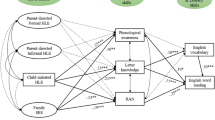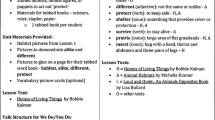Abstract
Early linguistic competencies are necessary prerequisites for later reading and writing abilities and thus for a successful school career. Various child and family characteristics have been identified as important predictors of children’s linguistic abilities, such as intelligence or the “home literacy environment” (HLE). Therefore, one way to improve children’s competencies is by enhancing the HLE they live in. Family literacy programs have proven to be successful with this task. However, most interventions used to improve HLE were fairly intensive and costly. In this study a nonintensive intervention procedure was developed to improve both, HLE and linguistic competencies. The sample consisted of 125 German children in their last year of kindergarten (mean child age at the beginning of the study: 5 years, 5 months) and their families who showed an above average socio-economic status. All parents were offered to participate in the intervention, consisting of providing them with relevant information on HLE at one evening meeting and providing an additional individual reading session that introduced them to the concept of dialogic reading. HLE and children’s linguistic competencies were assessed before and after the intervention. Participating and non-participating families did not differ in any of the study variables at the beginning of the study. However, families who participated in the interventions not only improved their HLE, but children in those families also showed greater linguistic competency development when compared with the non-participating group. The results indicate that less intensive interventions can have an impact on home learning environments and children’s linguistic development.


Similar content being viewed by others
References
Aikens, N. L., & Barbarin, O. (2008). Socioeconomic differences in reading trajectories: The contribution of family, neighborhood, and school contexts. Journal of Educational Psychology, 100, 235–251.
Bronfenbrenner, U. (1979). Contexts of child rearing: Problems and prospects. American Psychologist, 34, 844–850.
Burgemeister, B., Blum, L., & Lorge, J. (1972). Columbia Mental Maturity Scale. New York, NY: Harcourt Brace Jovanovich.
Burgess, S. R. (2002). The influence of speech perception, oral language ability, the home literacy environment, and pre-reading knowledge on the growth of phonological sensitivity: A one-year longitudinal investigation. Reading and Writing: An Interdisciplinary Journal, 15, 709–737.
Burgess, S. R., Hecht, S. A., & Lonigan, C. J. (2002). Relations of the home literacy environment (HLE) to the development of reading-related abilities: A one-year longitudinal study. Reading Research Quarterly, 37, 408–426.
Bus, A. G., van IJzendoorn, M. H., & Pellegrini, A. D. (1995). Joint book reading makes for success in learning to read: A meta-analysis on intergenerational transmission of literacy. Review of Educational Research, 65, 1–21.
Cronan, T. A., Cruz, S. G., Arriaga, R. I., & Sarkin, A. J. (1996). The effects of a community-based literacy program on young children’s language and conceptual development. American Journal of Community Psychology, 24, 251–272.
Davidse, N. J., de Jong, M. T., Bus, A. G., Huijbregts, S. C. J., & Swaab, H. (2011). Cognitive and environmental predictors of early literacy skills. Reading and Writing: An Interdisciplinary Journal, 24, 395–412.
de Jong, P. F., & Leseman, P. P. M. (2001). Lasting effects of home literacy on reading achievement in school. Journal of School Psychology, 39, 389–414.
Dickinson, D. K., Griffith, J. A., Michnick Golinkoff, R., & Hirsh-Pasek, K. (2012). How reading books fosters language development around the world. Child Development Research, 1–15. doi:10.1155/2012/602807.
Dunning, D. B., Mason, J. M., & Stewart, J. P. (1994). Reading to preschoolers: A response to Scarborough and Dobrich (1994) and recommendations for future research. Developmental Review, 14, 324–339.
Ennemoser, M., Marx, P., Weber, J., & Schneider, W. (2012). Spezifische Vorläuferfertigkeiten der Lesegeschwindigkeit, des Leseverständnisses und des Rechtschreibens. Evidenz aus zwei Längsschnittstudien vom Kindergarten bis zur 4. Klasse [Specific precursors of decoding speed, reading comprehension, and spelling: Evidence from two longitudinal studies from kindergarten to Grade 4]. Zeitschrift für Entwicklungspsychologie und Pädagogische Psychologie, 44(2), 53–67.
Esser, G. (2002). BUEVA—Basisdiagnostik für umschriebene Entwicklungsstörungen im Vorschulalter [BUEVA—Basis diagnostics for developmental disorders at pre-school age]. Göttingen: Beltz.
Hargrave, A. C., & Sénéchal, M. (2000). A book reading intervention with preschool children who have limited vocabularies: The benefits of regular reading and dialogic reading. Early Childhood Research Quarterly, 15, 75–90.
Harper, S., Platt, A., & Pelletier, J. (2011). Unique effects of a family literacy program on the early reading development of English language learners. Early Education and Development, 22, 989–1008.
Hattie, J. (2013). Visible learning: A synthesis of over 800 meta-analyses relating to achievement. London: Routledge.
Hood, M., Conlon, E., & Andrews, G. (2008). Preschool home literacy practices and children’s literacy development: A longitudinal analysis. Journal of Educational Psychology, 100, 252–271.
Huebner, C. E. (2000). Promoting toddlers’ language development through community-based intervention. Journal of Applied Developmental Psychology, 21, 513–535.
Joshi, R. M. (2005). Vocabulary: A critical component of comprehension. Reading and Writing Quarterly, 21, 209–219.
Kiese-Himmel, C. (2005). AWST-R—Aktiver Wortschatztest für 3- bis 5-jährige Kinder [AWST-R—Active vocabulary test for 3- to 5-year-old children]. Göttingen: Hogrefe.
Kluczniok, K., Lehrl, S., Kuger, S., & Rossbach, H.-G. (2013). Quality of the home learning environment during preschool age—Domains and contextual conditions. European Early Childhood Education Research Journal, 21, 420–438.
Koponen, T., Aunola, K., Ahonen, T., & Nurmi, J.-E. (2007). Cognitive predictors of single digit band procedural calculation skills and their covariation with reading skill. Journal of Experimental Child Psychology, 97, 220–241.
Krajewski, K., & Schneider, W. (2009). Early development of quantity to number-word linkage as a precursor of mathematical school achievement and mathematical difficulties: Findings from a four-year longitudinal study. Learning and Instruction, 19, 513–526.
Landerl, K., Wimmer, H., & Frith, U. (1997). The impact of orthographic consistency on dyslexia: A German–English comparison. Cognition, 63, 315–334.
Lever, R., & Sénéchal, M. (2011). Discussing stories: On how a dialogic reading intervention improves kindergartners’ oral narrative construction. Journal of Experimental Child Psychology, 108, 1–24.
Lonigan, C. J. (1994). Reading to preschoolers exposed: Is the emperor really naked? Developmental Review, 14, 303–323.
Marx, P. (2007). Lese- und Rechtschreiberwerb [Acquisition of reading and spelling competences]. Paderborn: Ferdinand Schöningh.
McElvany, N., Becker, M., & Lüdtke, O. (2009). Die Bedeutung familiärer Merkmale für Lesekompetenz, Wortschatz, Lesemotivation und Leseverhalten [The role of family variables in reading literacy, vocabulary, reading motivation, and reading behavior]. Zeitschrift für Entwicklungspsychologie und Pädagogische Psychologie, 41(3), 121–131.
Mol, S. E., Bus, A. G., de Jong, M. T., & Smeets, D. J. H. (2008). Added value of dialogic parent–child book readings: A meta-analysis. Early Education and Development, 19, 7–26.
Näslund, J. C., & Schneider, W. (1996). Kindergarten letter knowledge, phonological skills, and memory processes: Relative effects on early literacy. Journal of Experimental Child Psychology, 62, 30–59.
Niklas, F., Möllers, K., & Schneider, W. (2013). Die frühe familiäre Lernumwelt als Mediator zwischen strukturellen Herkunftsmerkmalen und der basalen Lesefähigkeit am Ende der ersten Klasse [The early learning environment provided by the family as a mediator between structural family background and basic reading abilities at the end of Grade 1]. Psychologie in Erziehung und Unterricht, 60, 94–111.
Niklas, F., & Schneider, W. (2013). Home literacy environment and the beginning of reading and spelling. Contemporary Educational Psychology, 38, 40–50.
Piasta, S. B., Petscher, Y., & Justice, L. M. (2012). How many letters should pre-schoolers in public programs know? The diagnostic efficiency of various preschool letter-naming benchmarks for predicting first-grade literacy achievement. Journal of Educational Psychology, 104, 945–958.
Puolakanaho, A., Ahonen, T., Aro, M., Eklund, K., Leppänen, P. H. T., Poikkeus, A.-M., … Lyytinen, H. (2008). Developmental links of very early phonological and language skills to second grade reading outcomes: Strong to accuracy but only minor to fluency. Journal of Learning Disabilities, 41, 353–370.
Roberts, J., Jurgens, J., & Burchinal, M. (2005). The role of home literacy practices in preschool children’s language and emergent literacy skills. Journal of Speech, Language, and Hearing Research, 48, 345–359.
Saint-Laurent, L., & Giasson, J. (2005). Effects of a family literacy program adapting parental intervention to first graders’ evolution of reading and writing abilities. Journal of Early Childhood Literacy, 5, 253–278.
Scarborough, H. S., & Dobrich, W. (1994). On the efficacy of reading to preschoolers. Developmental Review, 14, 245–302.
Schatschneider, C., Fletcher, J. M., Francis, D. J., Carlson, C. D., & Foorman, B. R. (2004). Kindergarten prediction of reading skills: A longitudinal comparative analyses. Journal of Educational Psychology, 96, 265–282.
Schneider, W., & Näslund, J. C. (1999). The impact of early phonological processing skills on reading and spelling in school: Evidence from the Munich Longitudinal Study. In F. E. Weinert & W. Schneider (Eds.), Individual development from 3 to 12: Findings from the Munich Longitudinal Study (pp. 126–147). Cambridge: Cambridge University Press.
Sénéchal, M., & LeFevre, J.-A. (2002). Parental involvement in the development of children’s reading skill: A five-year longitudinal study. Child Development, 73, 445–460.
Sénéchal, M., & Young, L. (2008). The effect of family literacy interventions on children’s acquisition of reading from kindergarten to grade 3: A meta-analytic review. Review of Educational Research, 78, 880–907.
Seymour, P. H. K., Aro, M., & Erskine, J. M. (2003). Foundation literacy acquisition in European orthographies. British Journal of Psychology, 94, 143–174.
St. Pierre, R. G., Ricciuti, A. E., & Rimdzius, T. A. (2005). Effects of a family literacy program on low-literate children and their parents: Findings from an evaluation of the Even Start family literacy program. Developmental Psychology, 41, 953–970.
Torgesen, J. K. (2002). The prevention of reading difficulties. Journal of School Psychology, 40, 7–26.
Torppa, M., Poikkeus, A.-M., Laakso, M.-L., Eklund, K., & Lyytinen, H. (2006). Predicting delayed letter knowledge development and its relation to grade 1 reading achievement among children with and without familial risk for dyslexia. Developmental Psychology, 42, 1128–1142.
Torppa, M., Tolvanen, A., Poikkeus, A.-M., Eklund, K., Lerkkanen, M.-K., Leskinen, E., & Lyytinen, H. (2007). Reading development subtypes and their early characteristics. Annals of Dyslexia, 57, 3–32.
van Steensel, R., McElvany, N., Kurvers, J., & Herppich, S. (2011). How effective are family literacy programs? Results of a meta-analysis. Review of Educational Research, 81, 69–96.
Wegener, B. (1988). Kritik des Prestiges [Criticism of the prestige]. Opladen: Westdeutscher Verlag.
Weinert, F. E., Schneider, W., Stefanek, J., & Weber, A. (1999). LOGIC: Introduction and overview. In F. E. Weinert & W. Schneider (Eds.), Individual development from 3 to 12. Findings from the Munich Longitudinal Study (pp. 1–8). Cambridge: Cambridge University Press.
Whitehurst, G. J., Falco, F. L., Lonigan, C. J., Fischel, J. E., DeBaryshe, B. D., Valdez-Menchaca, M. C., & Caulfield, M. (1988). Accelerating language development through picture book reading. Developmental Psychology, 24, 552–559.
Whitehurst, G. J., & Lonigan, C. J. (1998). Child development and emergent literacy. Child Development, 69, 848–872.
Wieler, P. (1997). Vorlesen in der Familie. Fallstudien zur literarisch-kulturellen Sozialisation von Vierjährigen [Reading to children in the family. A case-study about literary–cultural socialisation of four-year-olds]. Weinheim: Juventa.
Author information
Authors and Affiliations
Corresponding author
Rights and permissions
About this article
Cite this article
Niklas, F., Schneider, W. With a little help: improving kindergarten children’s vocabulary by enhancing the home literacy environment. Read Writ 28, 491–508 (2015). https://doi.org/10.1007/s11145-014-9534-z
Published:
Issue Date:
DOI: https://doi.org/10.1007/s11145-014-9534-z




